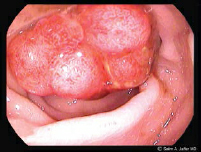Colonoscopies are not something we talk about very often in polite company. The word “colonoscopy” is often accompanied by a grimace or a chuckle. Unlike, say, mammograms or pap smears, colonoscopies are rarely something parents discuss with their children, nor are the risk factors or signs regularly discussed. This is extremely unfortunate, because screening for colon cancer is something everyone needs to be familiar with – and while colonoscopies are not the only method of screening, they are by far the most accurate.
Colorectal cancer screening is recommended for virtually everyone starting in their mid-40s or early 50s, and even earlier for some high-risk individuals. Like many cancers, colon cancer develops originates in a specific location before potentially spreading to other areas of the body (metastasizing), often fatally. But unlike a number of cancers, colon cancer often develops slowly and in a predictable manner. Furthermore, pre-cancerous growths in the colon, known as polyps, can often be detected long before they actually become cancerous, allowing for safe and effective removal. This means colon cancer is particularly preventable and survivable compared to many cancers – but only if it is screened for and discovered early!

What You Need to Know
First off, knowing when to start talking to your doctor about screening is the most important step. In most cases, it is advised that someone with no symptoms should start screening at age 50. For African-Americans, the age to begin screening is instead 45 due to increased risk of colon cancer. If you have no symptoms and are not considered high-risk, you should talk to your doctor about starting the screening process as you approach this age.
So that leaves those with prior symptoms and those who are considered high-risk. First we’ll talk about how to determine if you are a high-risk case, and then we’ll talk a bit about symptoms that might suggest you need to talk to your doctor about early screening.
In most cases, having relatives who have been diagnosed with colon cancer is a good reason to talk to your doctor about your risk level. If someone in your immediate family has or had colon cancer, you’re likely to need your first screening at the age of 40, or 10 years before your relative’s diagnosis – whichever comes first. That means if your father or sister had colon cancer diagnosed at the age of 45, you’re probably going to need to be screened at age 35 yourself.
What about your extended family? Generally, if you have two or more second-degree relatives diagnoses with colon cancer, you’ll need to start screening at age 40. If you have less than two relations diagnosed with colon cancer, your recommended screening date is once again 50 years of age. In any case, it’s worth discussing with your doctor if your family has a history of colon cancer in order to make sure you both understand the correct timeframe to begin screening.
Finally, there are those who develop symptoms before the age of their first regularly-scheduled screening. There are, unfortunately, often no symptoms of early cancer. Symptoms that may develop over time include changes in bowel habits such as thin, string-like or pellet-like stools, changes in stool consistency, loose stools, diarrhea or constipation. Patients with polyps or cancer may have rectal bleeding or concealed bleeding detected only by a paper smear test or “card test”. A smear of stool is placed on the card which is analyzed in a lab for the presence of blood. Patients with cancer may become anemic, lose weight, and develop abdominal pain. Ideally, polyps can be detected by a scheduled colonoscopy before any symptoms arise, but it’s important to speak to your doctor if you experience any of the above.
The difference between early detection and late detection of colon cancer can be life and death. And knowing when to speak to your doctor about scheduling your first screening exam is the key to beating colon cancer before it strikes. Don’t be afraid to start the conversation!